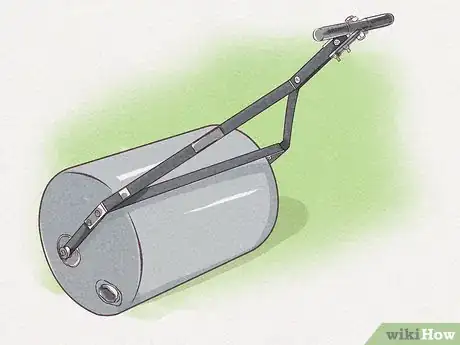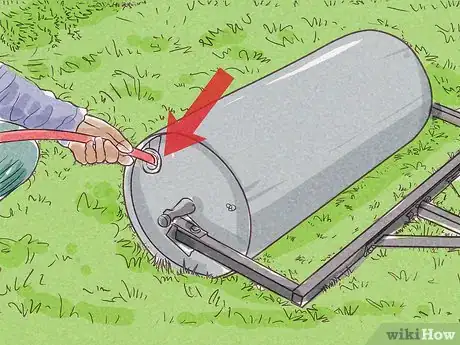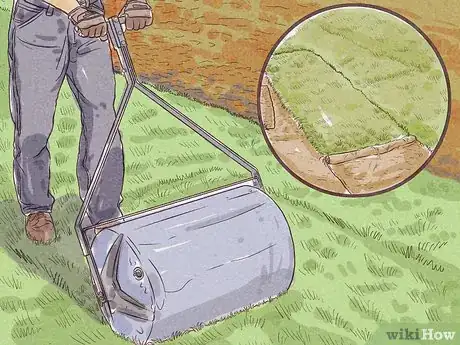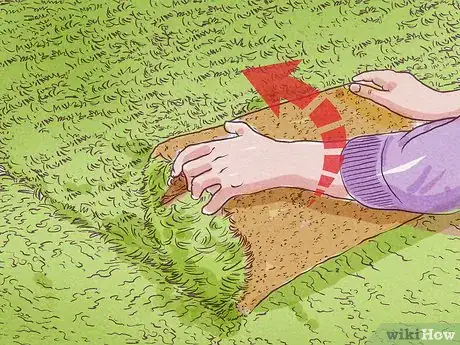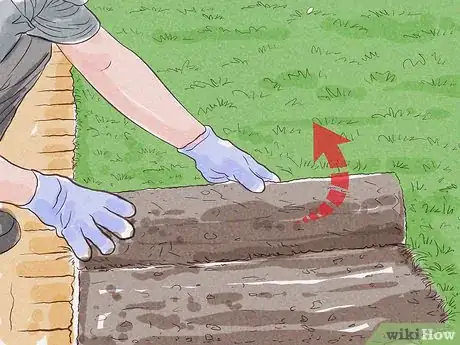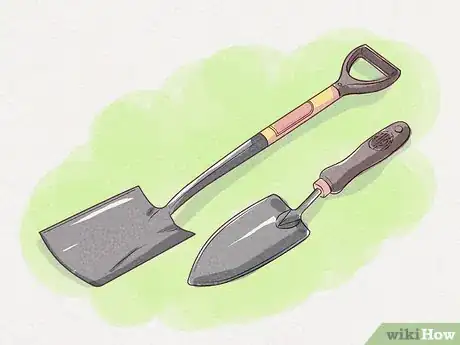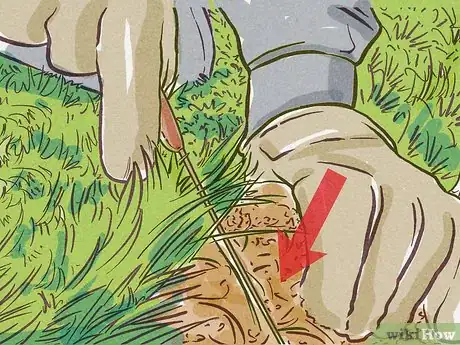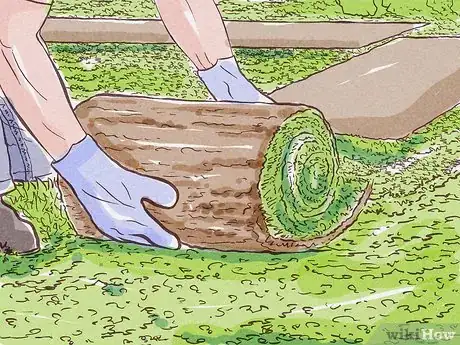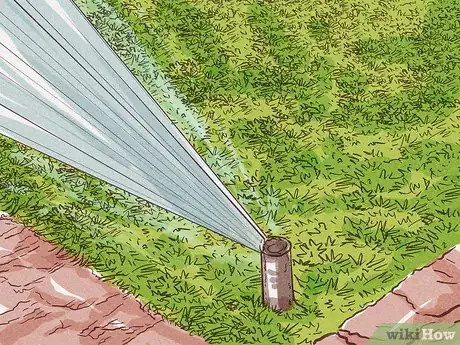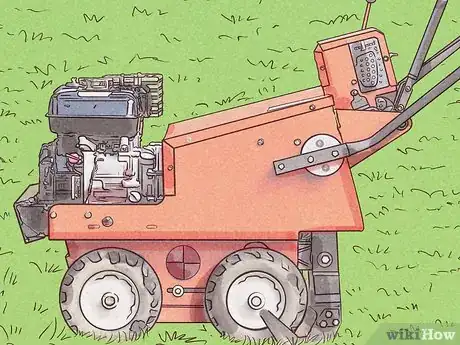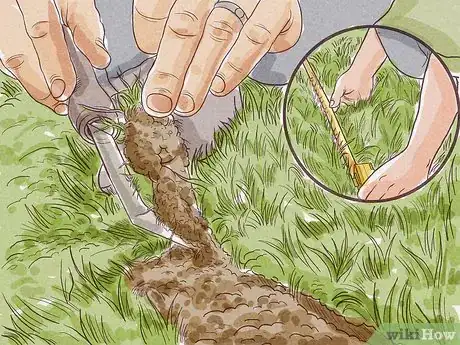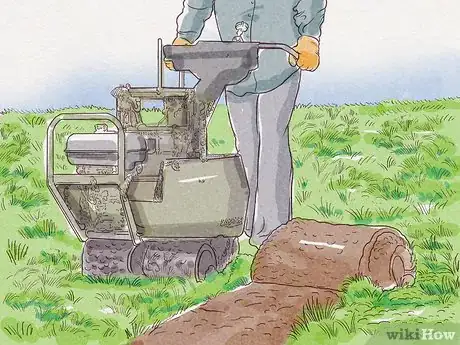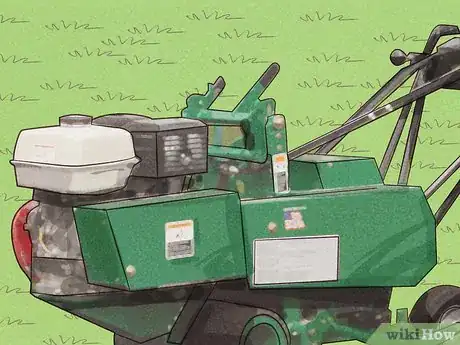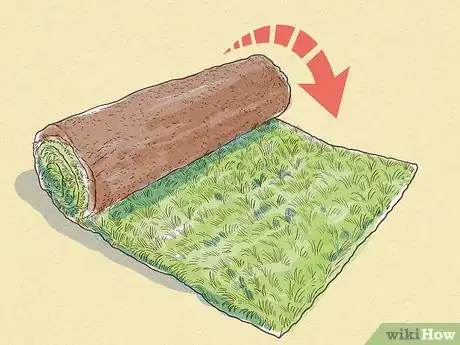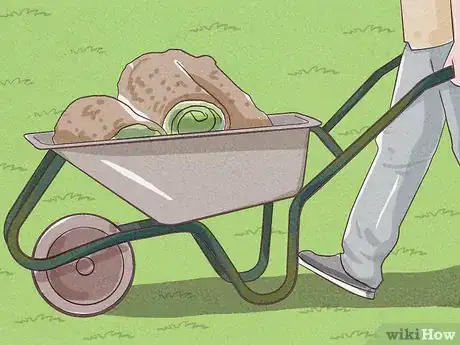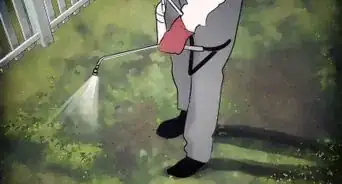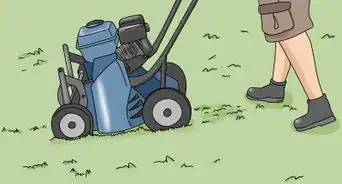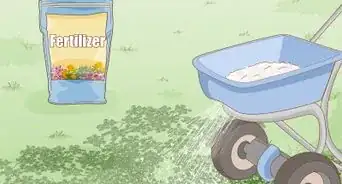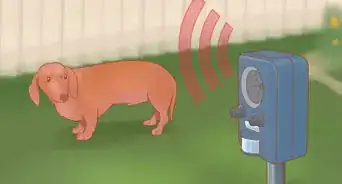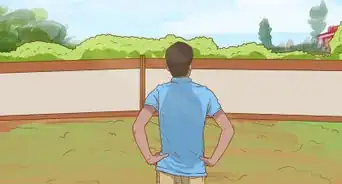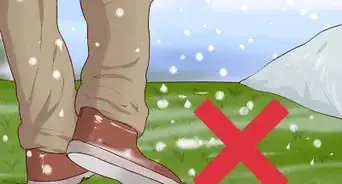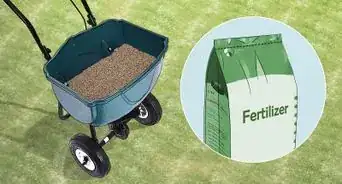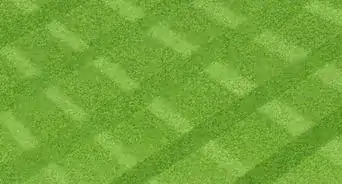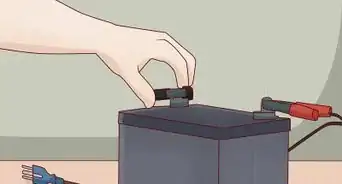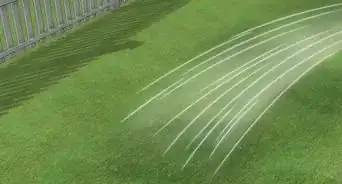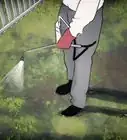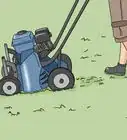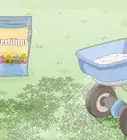This article was co-authored by Lauren Kurtz. Lauren Kurtz is a Naturalist and Horticultural Specialist. Lauren has worked for Aurora, Colorado managing the Water-Wise Garden at Aurora Municipal Center for the Water Conservation Department. She earned a BA in Environmental and Sustainability Studies from Western Michigan University in 2014.
There are 8 references cited in this article, which can be found at the bottom of the page.
This article has been viewed 47,557 times.
After you lay sod, you can roll it with a lawn roller to flatten out the edges. Your sod will look flawless after it is rolled a few times. If you want to replant your healthy sod elsewhere or use sod for compost, you can cut out your sod and roll it up for transport. Grab your lawn equipment, tend to your sod, and soon you'll have the backyard of your dreams.
Steps
Using a Lawn Roller
-
1Rent or purchase a lawn roller from a home supply store. You can rent lawn rollers by the hour, day, or week. They cost about $18 (£12) a day or $72 (£51) a week. Residential law rollers range from about 24–36 inches (610–910 mm) wide, which works well for home landscaping projects.[1]
- If you are completing many landscaping projects, it may be more cost-effective to purchase your own. Lawn rollers cost about about $100-200 (£71-144) in store, depending on size and model.
-
2Fill up your lawn roller water tank. Keep your lawn roller on level ground, and unscrew the cap on the side. Insert your garden hose into the hole in the tank, turn on your water, and pull the trigger on your sprayer if you have one. Most have around a 90 US gal (340 L) capacity.[2]
- It should take about 20 minutes to fill the tank completely, and you will see the water level come towards the opening when the tank is full.
- The weight of the water will help flatten out your sod as you roll it.
Advertisement -
3Walk your lawn roller over your sod slowly where 2 pieces meet. Position your lawn roller at the edge of your sod, where 2 pieces come together. Slowly roll over the edges, and then roll over the entirety of your sod. Rolling over the edges of the sod flattens out the edges and bonds the both pieces of sod together.[3]
- Your sod will look seamless and healthy after you roll it.
-
4Continue rolling over all of your sod. Turn around when you reach the end of a section, and begin rolling in the opposite direction. Roll over the entirety of your sod pieces, including the edges and the middle.[4]
- Maintain a slow and steady pace until you flatten over all of your sod.
- Try to not overlap areas you've already rolled. You want your sod to all be rolled over the same amount so that your lawn stays even.
-
5Roll your sod once a day for 7 days for best results. This will make your sod completely flat and seamless, so your lawn will look beautiful![5]
Cutting out Small Sections
-
1Locate either garden spades, an edger, or a shovel to make your cuts. You can purchase these tools at a home supply store. Smaller sod removal projects can be accomplished using hand tools rather than larger machines.
- These tools work well for smaller sections of sod, like if you are making a garden bed in your lawn.
-
2Cut strips of sod about 1 foot (0.30 m) wide with your tools. To lift up your sod, find one end piece, and slide your tool underneath the sod. With your tool, cut the sod into 1–2 feet (0.30–0.61 m) long pieces.[6]
- You can cut off any deep roots and remove any loose soil as you lift up.
-
3Roll up your sod gently and neatly to transport it elsewhere. Your sod should be fairly easy to move around since it is in smaller sections. Begin rolling from the end of one section, and roll up your sod until you reach the end.[7]
- You can replant your sod or use it for compost at this point. Before you use your sod for compost, make sure it hasn't been treated with chemical fertilizers or pesticides.
Removing Large Sections
-
1Water your sod 2-3 days ahead of time so it is easy to work with. Thoroughly saturate your sod with water from your garden hose, and let it dry for a couple days before you dig it up. You want your soil to be moist rather than soggy.[8]
- If overly wet, your sod will be very heavy when you attempt to roll it.
- Dry sod can be hard to work with and can easily fall apart.
-
2Rent a sod cutter from a home supply store to remove large sections. Sod cutters are steel-bladed tools that make cutting up sod significantly easier than cutting it by hand. On average, these cost about $100 (€81) a day or $400 (€325) a week to rent.
- Sod cutters make it easy to roll your sod, though they can be powerful and difficult to maneuver if you haven't used one before. Consider hiring a professional to help you with the job.
- If you are renting a sod cutter, talk to an employee about how to safely operate the machine. These machines have sharp objects and fast moving parts, so always handle them with care.
-
3Measure the depth of your sod by removing a small patch with a shovel. Insert your shovel into the grass, and pull up the shovel to remove a small amount. Look at the sod and roots, and use a ruler to measure the depth. Most sod is usually 1–2 inches (2.5–5.1 cm) deep.[9]
- Make sure you include your roots in your measurements if you want to replant the sod.
-
4Turn on the sod cutter if you are removing large pieces of sod. Pull the cord to turn on the engine, and turn the knob to select your cutting depth, up to 2.5 inches (6.4 cm). Position your sod cutter at the corner of an area to cut out, and move the lever controlling the blade towards the ground.[10]
- It is helpful to set your cutting depth 1⁄4 inch (0.64 cm) thicker than your measurements to allot for the entire root system.
- Make sure you read all instructions carefully before use. Sod cutters should be handled with care, as they have an engine and sharp moving parts.
-
5Walk your sod cutter in a straight line to make your cuts. After you cut about 5 feet (1.5 m), check your sod to make sure your cuts are deep enough. Adjust the depth knob if you need to, and walk your cutter until you've cut all of the designated sod.[11]
- The cutter will do the work for you, so making your cuts is relatively easy and straightforward.
-
6Roll up each piece of sod like a rug. Start at the end of one piece, and gently fold one side on top of the other. Then, slowly start rolling your sod in the direction of your fold. Make sure your sod stays in one whole piece as you roll. Keep rolling up your sod until you reach the end of your piece.[12]
- Grab a friend if you need help rolling your sod.
-
7Transport your sod with a wheelbarrow if you'd like. Lift up your rolled sod and place it carefully inside your wheelbarrow. If you need assistance lifting the sod, grab a friend to help.
- You can now replant your sod to another location to replace a lawn or turn your sod into compost material.
Expert Q&A
-
QuestionCan I roll sod after it's been down for 6 weeks?
 Lauren KurtzLauren Kurtz is a Naturalist and Horticultural Specialist. Lauren has worked for Aurora, Colorado managing the Water-Wise Garden at Aurora Municipal Center for the Water Conservation Department. She earned a BA in Environmental and Sustainability Studies from Western Michigan University in 2014.
Lauren KurtzLauren Kurtz is a Naturalist and Horticultural Specialist. Lauren has worked for Aurora, Colorado managing the Water-Wise Garden at Aurora Municipal Center for the Water Conservation Department. She earned a BA in Environmental and Sustainability Studies from Western Michigan University in 2014.
Professional Gardener It's better to roll it immediately after planting, but it wouldn’t hurt to roll the sod after 6 weeks. However, the results may not be as good.
It's better to roll it immediately after planting, but it wouldn’t hurt to roll the sod after 6 weeks. However, the results may not be as good.
Things You'll Need
Using a Lawn Roller
- Lawn roller
- Water
- Garden hose
Cutting out Small Sections
- Garden spades or edger
- Shovel
Removing Large Sections
- Shovel
- Sod cutter
- Sod cutter instructions
- Ruler
- Wheelbarrow (optional)
References
- ↑ http://www.thesawguy.com/best-lawn-roller/
- ↑ https://youtu.be/9MXLJ4pAw28?t=47s
- ↑ https://youtu.be/9MXLJ4pAw28?t=1m19s
- ↑ https://youtu.be/9MXLJ4pAw28?t=2m1s
- ↑ https://youtu.be/9MXLJ4pAw28?t=3m
- ↑ http://www.finegardening.com/article/4-ways-to-remove-sod
- ↑ http://living.thebump.com/remove-sod-replanting-6768.html
- ↑ http://www.finegardening.com/article/4-ways-to-remove-sod
- ↑ http://living.thebump.com/remove-sod-replanting-6768.html
